- Home
- Dan Simmons
The Hollow Man
The Hollow Man Read online
The Hollow Man
For an instant Bremen was sure that the plane had exploded, that some terrorist bomb had been triggered, so brilliant was the flash of white light, so loud was the sudden screaming of a hundred and eighty-seven voices in his mind. A hundred and eighty-seven minds suddenly reminded of their own mortality by the simple routine of an aircraft taking off.
The fragments of language cut Bremen like so many shards of dull steel; the images lacerated and sliced. Bremen opened his eyes and saw the cabin as normal as it could be, sunlight streaming through the window to his left, people lounging and reading and dozing … but the panicked images kept coming, the vertigo was all too great, and Bremen was pummeled by the sounds and textures and discordant colors of a thousand uninvited thoughts.
“[The Hollow Man] is totally alive and brilliantly focused. Although Simmons is very clearly his own man—no writer in American popular fiction is able to mix the real and the unreal in quite the same proportions—think of what would happen if Thomas Harris and Pete Dexter decided to collaborate on an SF/Horror novel, and you’ll be in the ballpark.”
—Stephen King
“Dan Simmons is a breathtaking writer.”
—Harlan Ellison
BOOKS BY DAN SIMMONS
Song of Kali
Carrion Comfort
* Hyperion
* The Fall of Hyperion
Entropy’s Bed at Midnight
Summer of Night
* The Hollow Man
Children of the Night
Summer Sketches
Fires of Eden
* Endymion
* The Rise of Endymion
* Available from Bantam Books
THE HOLLOW MAN
A Bantam Book
Bantam hardcover edition / October 1993
Bantam paperback edition / October 1993
Grateful acknowledgment is made for permission to reprint the following:
“Elegy for Jane,” copyright © 1950 by Theodore Roethke. Reprinted by permission of Doubleday, a division of Bantam Doubleday Dell Publishing Group, Inc.
Illustration from Foundations of Mechanics by R. Abraham and J. Marsden. Copyright © 1978 by Addison-Wesley Publishing Company, Inc. Reprinted by permission of the publisher.
“The Hollow Men,” from Collected Poems, 1909–1962 by T. S. Eliot. Copyright © 1936 by Harcourt Brace Jovanovich, Inc. Copyright © 1964, 1963 by T. S. Eliot. Reprinted by permission of the publisher.
All rights reserved.
Copyright © 1992 by Dan Simmons.
Library of Congress Catalogue Card Number: 92-8086.
No part of this book may be reproduced or transmitted in any form or by any means, electronic or mechanical, including photocopying, recording, or by any information storage and retrieval system, without permission in writing from the publisher.
For information address: Bantam Books.
eISBN: 978-0-307-78190-1
Bantam Books are published by Bantam Books, a division of Bantam Doubleday Dell Publishing Group, Inc. Its trademark, consisting of the words “Bantam Books” and the portrayal of a rooster, is Registered in U.S. Patent and Trademark Office and in other countries. Marca Registrada. Bantam Books, 1540 Broadway, New York, New York 10036.
v3.1
ACKNOWLEDGMENTS
The author would like to thank the following people for turning an impossible task into a merely difficult one:
Sue Bolton and Edward Bryant for reading the book that was written rather than the one that was expected by others. Tabitha and Steve King for the long, cross-country reading marathon … and for the helpful words that followed. Niki Gernold for demonstrating the mechanics of telepathy. Betsy Mitchell for showing the courage of our shared convictions. Ellen Datlow for liking (and buying) the story that began it all, lo these ten long years ago. Richard Curtis for eschewing obfuscation via quintessential professionalism. Mathematician Ian Stewart for provoking a passionate response from a mathematical illiterate. Karen and Jane Simmons for their love, support, and tolerance as I perversely kept trying to turn a merely difficult task back into an impossible one.
In addition to these wonderfully alive people, I must thank several who are no longer with us:
Dante Alighieri, John Ciardi, T. S. Eliot, Joseph Conrad, and Thomas Aquinas
All of whom have explored, far more eloquently than my powers would ever allow, the obsessive theme of—
Wandering between two worlds, one dead
The other powerless to be born
Contents
Cover
Other Books by This Author
Title Page
Copyright
Acknowledgments
Epigraph
Shadow at Evening
A Banner There Upon the Mist
EYES
Out of the Dead Land
On the Joyless Beach
EYES
Lasciate Ogne Speranza, Voi Ch’intrate
EYES
Where the Deadmen Left Their Bones
EYES
In the Twilight Kingdom
At the Violet Hour
EYES
In Rats’ Alley
EYES
Rat’s Coat, Crowskin, Crossed Staves
EYES
In This Hollow Valley
In This Valley of Dying Stars
EYES
This is Cactus Land
EYES
Wind in Dry Grass
EYES
There Are No Eyes Here
EYES
The Eyes Are Not Here
EYES
And Saw the Skull Beneath the Skin
EYES
We Are the Hollow Men
EYES
Malebolge
EYES
Geryon
EYES
We Are the Stuffed Men
EYES
Sightless, Unless
EYES I
EYES I DARE
EYES I DARE NOT
EYES I DARE NOT MEET
EYES I DARE NOT MEET IN
EYES I DARE NOT MEET IN DREAMS
Falls the Shadow
This Is the Way the World Ends
For Thine Is Life Is for Thine Is the
About the Author
Thou shalt prove how salty tastes another’s bread, and how hard a path it is to go up and down another’s stairs.
—Dante, Paradiso XVII
Eyes I dare not meet in dreams
In death’s dream kingdom
These do not appear.
—T. S. Eliot, The Hollow Men
Shadow at Evening
Bremen left the hospital and his dying wife and drove east to the sea. The roads were thick with Philadelphians fleeing the city for the unusually warm Easter weekend, so Bremen had to concentrate on traffic, leaving only the most tenuous of touches in his wife’s mind.
Gail was sleeping. Her dreams were fitful and drug-induced. She was seeking her mother through endlessly interlinked rooms filled with Victorian furniture. Images from these dreams slid between the evening shadows of reality as Bremen crossed the Pine Barrens. She awoke just as Bremen was leaving the parkway, and for the few seconds that the pain was not with her, Bremen was able to share the clarity of sunlight falling across the blue blanket at the foot of her bed; then he shared the quick vertigo of confusion as she thought—only for a second—that it was morning on the farm.
Her thoughts reached for him just as the pain returned, stabbing behind her left eye like a thin but infinitely sharp needle. Bremen grimaced and dropped the coin he was handing the tollbooth attendant.
“Something wrong, pal?” Bremen shook his head, fumbled out a dollar, and thrust it blindly at the man. Tossing his change into the Triumph’s
cluttered console, he concentrated on pushing the little car up through its gears while shielding himself from the worst of Gail’s pain. Slowly the agony faded, but her confusion washed over him like a wave of nausea.
She quickly gained control despite the shifting curtains of fear that fluttered at the edges of her consciousness. She subvocalized, concentrating on narrowing the spectrum of what she shared to a simulacrum of her voice.
Hi, Jerry.
Hi, yourself, kiddo. He sent the thought as he turned onto the exit of Long Beach Island. Bremen shared the visual—the startling green of grass and pine trees overlaid with the gold of April light, the sports car’s shadow leaping along the curve of the embankment as he followed the cloverleaf down to the road. Suddenly there came the unmistakable salt-and-rotting-vegetation scent of the Atlantic, and he shared that with her as well.
Nice. Gail’s thoughts were slurred with the static of too much pain and medication. She clung to the images he sent with an almost feverish concentration of will.
The entrance to the seaside community was disappointing: dilapidated seafood restaurants, overpriced cinder-block motels, endless marinas. But it was reassuring in its familiarity to both of them, and Bremen concentrated on seeing all of it. Gail began to relax a bit as the terrible swells of pain abated, and for a second her presence was so real that Bremen caught himself half turning to speak to her in the passenger’s seat. The pang of regret and embarrassment was sent before he could stifle it.
The driveways of beach homes were filled with families unpacking station wagons and carrying late dinners to the beach. The evening shadows carried the nip of early spring, but Bremen concentrated on the fresh air and the warmth of the low strips of sunlight as he drove north to Barnegat Light. He glanced right and caught a glimpse of half a dozen fishermen standing in the surf, their shadows intersecting the white lines of breakers.
Monet, thought Gail, and Bremen nodded, although he had actually been thinking about Euclid.
Always the mathematician. Gail’s voice faded as the pain returned. Half-formed sentences scattered like the spray rising from the white breakers.
Bremen left the Triumph parked near the lighthouse and walked through low dunes to the beach. He threw down the tattered blanket that they had carried so many times to just this spot. A group of children ran past, squealing as they came close to the surf. Despite the cold water and rapidly chilling air, they were dressed in swimsuits. One girl of about nine, all long white legs in a suit a year too small, pranced on the wet sand in an intricate and unconscious choreography with the sea.
The light was fading between the Venetian blinds. A nurse smelling of cigarettes and stale talcum powder came in to change the IV drip and to take a pulse. The intercom in the hall continued to make loud, imperative announcements, but it was difficult to understand them through the growing haze of pain. Dr. Singh arrived about six P.M. and spoke to her softly, but Gail’s attention was riveted on the doorway where the nurse with the blessed needle would arrive. The cotton swab on her arm was a delightful preliminary to the promised surcease of pain. Gail knew to the second how many minutes before the morphine would begin to work in earnest. The doctor was saying something.
“… your husband? I thought he would be staying the night.”
“Right here, doctor,” said Gail. She patted the blanket and the sand.
Bremen pulled on his nylon windbreaker against the chill of coming night. The stars were occluded by a high cloud layer that allowed only a bit of sky to show through. Far out to sea, an improbably long oil tanker moved along the horizon. Windows of the beach homes behind Bremen cast yellow rectangles on the dunes.
The smell of steak being grilled came to him on the breeze. Bremen tried to remember whether he had eaten that day or not. His stomach twisted in a mild shadow of the pain that still filled Gail even now that the medication was working. Bremen considered going back to the convenience store near the lighthouse to get a sandwich, but remembered an old Payday candy bar he had purchased from the vending machine in the hospital corridor during the previous week’s vigil. It was still in his jacket pocket. Bremen contented himself with chewing on the rock-hard wedge of peanuts while he watched the evening settle in.
Footsteps continued to echo in the hall. It sounded as if entire armies were on the march. The rush of footsteps, clatter of trays, and vague chatter of aides bringing dinner to the other patients reminded Gail of lying in bed as a child and listening to one of her parents’ parties downstairs.
Remember the party where we met? sent Bremen.
Mmmm. Gail’s attention was thin. Already the black fingers of panic were creeping around the edge of her awareness as the pain began to overwhelm the painkiller. The thin needle behind her eye seemed to grow hotter.
Bremen tried to send memory images of Chuck Gilpen’s party a decade earlier, of their first meeting, of that first second when their minds had opened to one another and they had realized I am not alone. And then the corollary realization, I am not a freak. There, in Chuck Gilpen’s crowded town house, amid the tense babble and even tenser neurobabble of mingling teachers and graduate students, their lives had been changed forever.
Bremen was just inside the door—someone had pressed a drink in his hand—when suddenly he had sensed another mindshield quite near him. He had put out a gentle probe, and immediately Gail’s thoughts had swept across him like a searchlight in a dark room.
Both were stunned. Their first reaction had been to increase the strength of their mindshields, to roll up like frightened armadillos. Each soon found that useless against the unconscious and almost involuntary probes of the other. Neither had ever encountered another telepath of more than primitive, untapped ability. Each had assumed that he or she was a freak—unique and unassailable. Now they stood naked before each other in an empty place. A second later, almost without volition, they flooded each other’s mind with a torrent of images, self-images, half memories, secrets, sensations, preferences, perceptions, hidden shames, half-formed longings, and fully formed fears. Nothing was held back. Every petty cruelty committed, sexual experiment experienced, and prejudice harbored poured out along with thoughts of past birthday parties, former lovers, parents, and an endless stream of trivia. Rarely had two people known each other as well after fifty years of marriage.
A minute later they met for the first time.
The beacon from Barnegat Light passed over Bremen’s head every twenty-four seconds. There were more lights burning out at sea now than along the dark line of beach. The wind had come up after midnight, and Bremen clutched the blanket around himself tightly. Gail had refused the needle when the nurse had last made her rounds, but her mindtouch was still clouded. Bremen forced the contact through sheer strength of will.
Gail had always been afraid of the dark. Many were the times during their nine years of marriage that he had reached out in the night with his mind or arm to reassure her. Now she was the frightened little girl again, left alone upstairs in the big old house on Burlingame Avenue. There were things in the darkness beneath her bed.
Bremen reached through her pain and confusion to share the sound of the sea with her. He told her stories about that day’s antics of Gernisavien, their calico cat. He lay in the hollow of the sand to match his body with hers on the hospital bed. Slowly she began to relax, to surrender her thoughts to his. She even managed to doze a few times without the morphine, and her dreams were the movement of stars between clouds and the sharp smell of the Atlantic.
Bremen described the week’s work at the farm—what little work he had done between hospital vigils—and shared the subtle beauty of the Fourier equations across the chalkboard in his study and the sunlit satisfaction of planting a peach tree by the front drive. He shared memories of their ski trip to Aspen the year before and the sudden shock of a searchlight reaching in to the beach from an unseen ship out at sea. He shared what little poetry he had memorized, but the words kept sliding into pure images and purer fe
elings.
The night drew on, and Bremen shared the cold clarity of it with his wife, adding to each image the warm overlay of his love. He shared trivia and hopes for the future. From seventy-five miles away he reached out and touched her hand with his. When he drifted off to sleep for only a few minutes, he sent her his dreams.
Gail died just before the first false light of dawn touched the sky.
A Banner There Upon the Mist
Two days after the funeral, Frank Lowell, the head of the mathematics department at Haverford, came to the house to assure Bremen that his job would be kept safe no matter what he decided to do in the coming months.
“Seriously, Jerry,” Frank was saying, “there’s nothing to worry about in that area. Do what you have to do to put things back together. Whenever you want it back, it’s yours.” Frank smiled his best little-boy smile and adjusted his rimless glasses. He seemed to have a chubby thirteen-year-old’s cheeks and chin behind the mat of beard. His blue eyes were open and guileless.
Satisfaction. A rival removed. Never really liked Bremen … too smart. The Goldmann research made him too much of a threat.
Images of the young blonde from MIT whom Frank had interviewed the summer before and slept with through the long winter.
Perfect. No more need for lying to Nell or inventing conferences to fly to over long weekends. Sheri can stay in town, near campus, and she’ll have the chair by next Christmas if Bremen stays away too long. Perfect.
“Seriously, Jer,” said Frank, and leaned forward to pat Bremen’s knee, “just take whatever time you need. We’ll consider it a sabbatical and keep the position open for you.”
Bremen looked up and nodded. Three days later he mailed in his letter of resignation to the college.
Dorothy Parks from the psychology department came on the third day after the funeral, insisted on making dinner for Bremen, and stayed until after dark, explaining the mechanisms of grief to him. They sat on the porch until darkness and chill drove them inside. It was beginning to feel like winter again.

 The Terror
The Terror Endymion
Endymion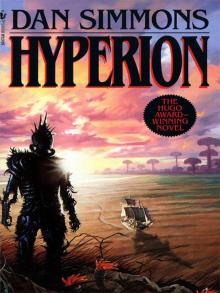 Hyperion
Hyperion The Crook Factory
The Crook Factory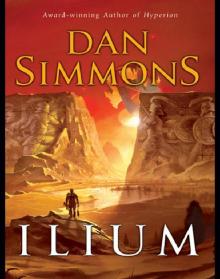 Ilium
Ilium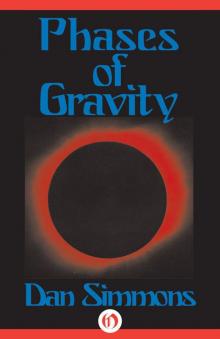 Phases of Gravity
Phases of Gravity Hardcase
Hardcase Fires of Eden
Fires of Eden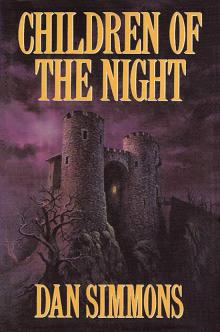 Children of the Night
Children of the Night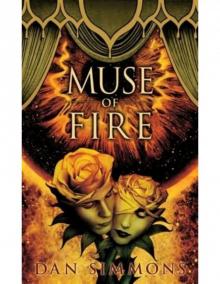 Muse of Fire
Muse of Fire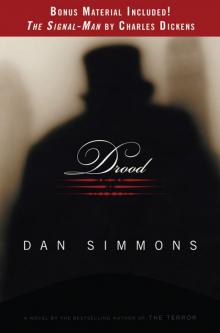 Drood
Drood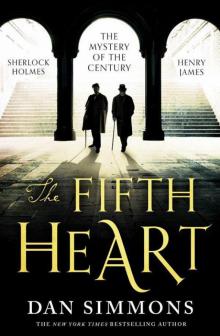 The Fifth Heart
The Fifth Heart Carrion Comfort
Carrion Comfort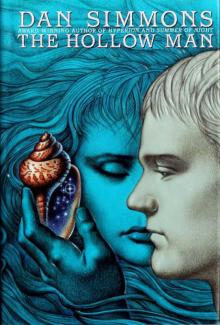 The Hollow Man
The Hollow Man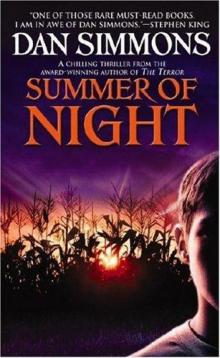 Summer of Night
Summer of Night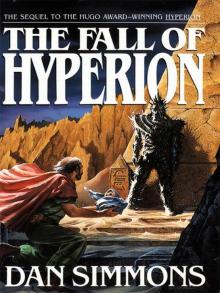 The Fall of Hyperion
The Fall of Hyperion Black Hills
Black Hills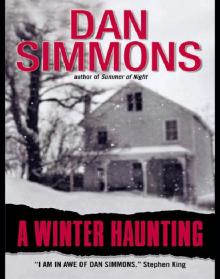 A Winter Haunting
A Winter Haunting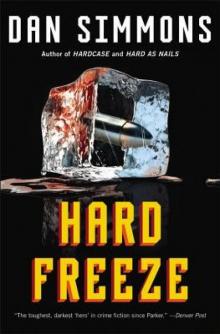 Hard Freeze
Hard Freeze Prayers to Broken Stones
Prayers to Broken Stones Hard as Nails
Hard as Nails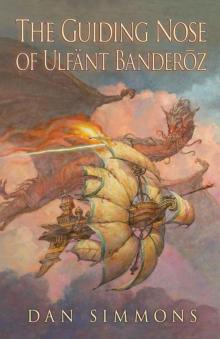 The Guiding Nose of Ulfant Banderoz
The Guiding Nose of Ulfant Banderoz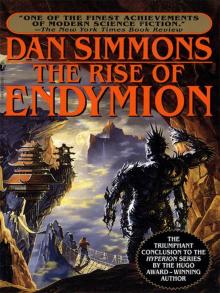 The Rise of Endymion
The Rise of Endymion Orphans of the Helix
Orphans of the Helix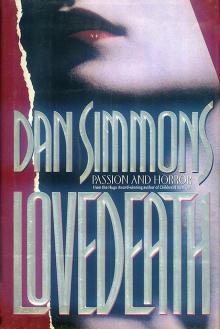 Lovedeath
Lovedeath Olympos
Olympos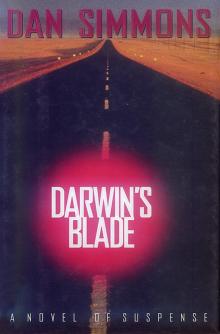 Darwin's Blade
Darwin's Blade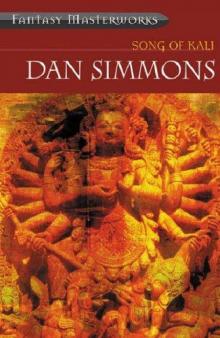 Song of Kali
Song of Kali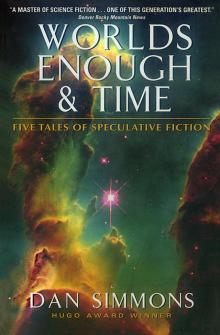 Worlds Enough & Time: Five Tales of Speculative Fiction
Worlds Enough & Time: Five Tales of Speculative Fiction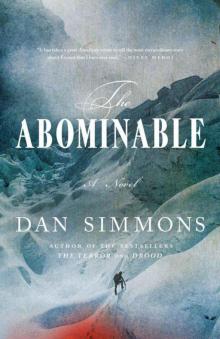 The Abominable
The Abominable The Death of the Centaur
The Death of the Centaur Hard as Nails jk-3
Hard as Nails jk-3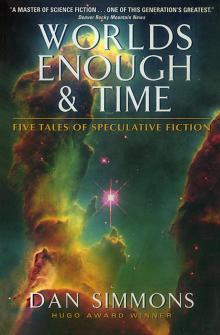 Worlds Enough & Time
Worlds Enough & Time Joe Kurtz Omnibus
Joe Kurtz Omnibus The Hyperion Cantos 4-Book Bundle
The Hyperion Cantos 4-Book Bundle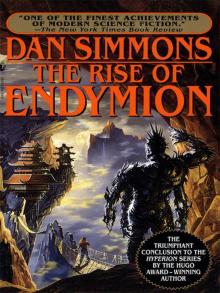 Rise of Endymion
Rise of Endymion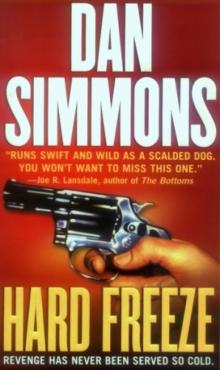 Hard Freeze jk-2
Hard Freeze jk-2 Olympos t-2
Olympos t-2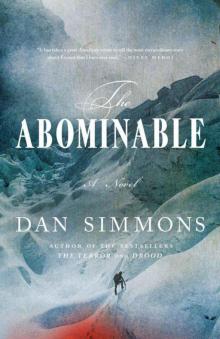 The Abominable: A Novel
The Abominable: A Novel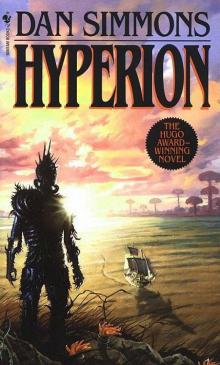 Hyperion h-1
Hyperion h-1 Remembering Siri
Remembering Siri Black Hills: A Novel
Black Hills: A Novel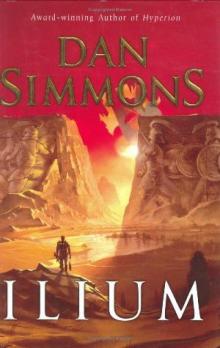 Ilium t-1
Ilium t-1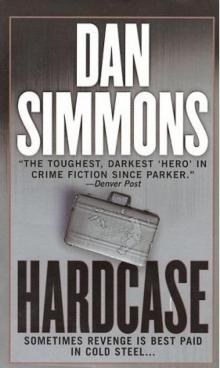 Hardcase jk-1
Hardcase jk-1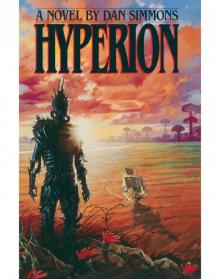 Hyperion 01 - Hyperion
Hyperion 01 - Hyperion